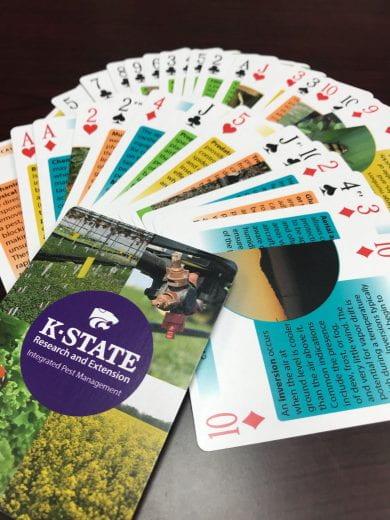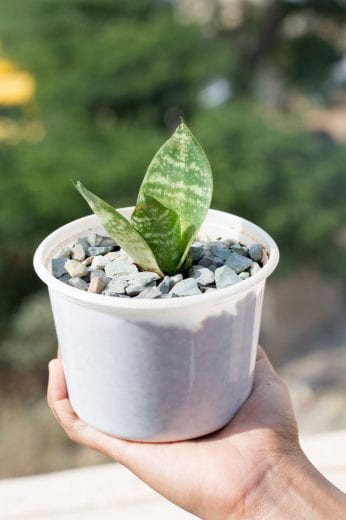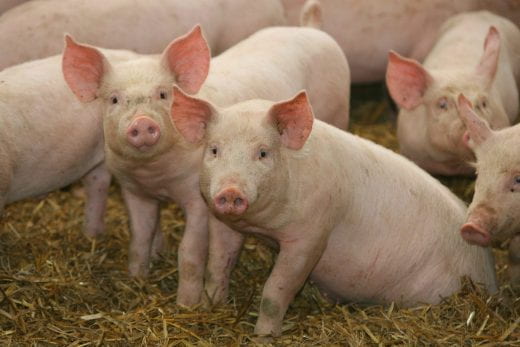In today’s Better Kansas, we share another K-State-KU collaboration – this time to prevent Type 2 diabetes, recycling know-how, things to know about common household chemicals, houseplants, herbicide-resistant grain sorghum hybrids and the Dec. 10 Winter Forage Conference. This is a small glimpse of what K-State Research and Extension across the state has to offer. Share on social media and subscribe! – Mary Lou Peter mlpeter@ksu.edu
Better Living, Better Communities
THE WILDCATS AND JAYHAWKS ARE AT IT AGAIN!
K-State Research and Extension and the University of Kansas Medical Center are teaming up to determine the best ways to educate Kansans about how to prevent Type 2 diabetes. The effort is starting with a pilot project in Lyon  County and the Central Kansas Extension District (Saline and
County and the Central Kansas Extension District (Saline and  Ottawa counties). Diabetes can lead to heart and blood vessel disease, nerve damage, eye diseases and other physical complications. But people who make certain lifestyle changes can cut their risk of developing Type 2 diabetes by 58% — and by 71% for people over 60, according to the U.S. Centers for Disease Control and Prevention. This pairing, KUMC and K-State, makes so much sense. An amazing medical research and teaching facility and an outstanding university research and outreach organization with local offices in every Kansas county whose mission is to provide research-based information. Seems like a natural to me.
Ottawa counties). Diabetes can lead to heart and blood vessel disease, nerve damage, eye diseases and other physical complications. But people who make certain lifestyle changes can cut their risk of developing Type 2 diabetes by 58% — and by 71% for people over 60, according to the U.S. Centers for Disease Control and Prevention. This pairing, KUMC and K-State, makes so much sense. An amazing medical research and teaching facility and an outstanding university research and outreach organization with local offices in every Kansas county whose mission is to provide research-based information. Seems like a natural to me.
IT’S BEEN AWHILE SINCE I’VE SEEN ANYTHING IN THE NEWS ABOUT RECYCLING, save some pretty compelling CBS news reports. We’ve had some other news dominating the headlines lately, but it’s hard to unthink that image of acres of floating plastic in the ocean. It’s difficult to imagine our lives without plastic. From milk containers to toothbrushes to bubble wrap and plastic peanuts surrounding holiday gifts – even car components and that Christmas wreath on my front door (yes, it’s fake), plastic is everywhere. Don’t know your #3s from your #7s? The short article It’s Easy to be Green sheds light on the differences and although written a few years back, is a good reminder to be conscious of what we’re buying and how we’re disposing of it. Now, if only I could remember to take those reusable cloth bags into the grocery store. But then, with COVID-19, not all grocery stores are allowing that. Such a dilemma!
SOMETIMES WE MAY BE A LITTLE COMPLACENT ABOUT THE CHEMICALS UNDER THE KITCHEN OR BATHROOM SINK, but listening to this short radio snippet Insight With Extension reminded me how dangerous some of those chemicals can be. That’s especially true if they get mixed together. For instance, mixing chlorine bleach and vinegar, two items commonly found in households, should never be done as it creates potentially lethal chlorine gas. And mixing bleach and ammonia? Forget about it! Listen in for more.
Better Farming, Ranching and Gardening
I’VE READ THAT HOUSEPLANTS ARE MAKING A COMEBACK which is great news, from my perspective. My daughter even asked for one for Christmas. Maybe it’s something to do with the pandemic but for whatever reason, it’s nice to have greenery in our homes year ‘round. And there are so many to choose from! Whether you’re a veteran at nurturing houseplants or considering your very first one, check out this video with print transcript on providing TLC to the leafy green companions that share your home. This reminds me of Swedish ivy trailing from macramé hangers but again, I digress. It turns out some plants are a little picky about temperatures and light. Take a look at a recent Horticulture newsletter to learn more about that and other topics.
CRABGRASS, KOCHIA AND SHATTERCANE BEWARE. These and other weeds are threats to grain sorghum (aka milo) yields. But a recent update on herbicide-resistant grain sorghum hybrids sorts through new hybrids sporting the traits iGrowth, Inzen and Double Play and provides information on what companies developed them. The article also addresses the stages of approval and availability. That’s important for Kansas, the No. 1 sorghum growing state. Did you know one bushel of grain sorghum equals 56 pounds? Or that grain sorghum is one of the oldest known grains, originating in Africa and India?
LANDOWNERS AND CATTLE PRODUCERS TAKE NOTE: THE WINTER FORAGE CONFERENCE ON DEC. 10 in Great Bend has both online and in-person options available. An impressive lineup of K-State specialists, USDA, and industry speakers will address the latest research, plus pasture management, weed control, alfalfa information and hay prices and statistics. The conference is offered by K-State and the Kansas Forage and Grassland Council. Registration is free to KSFGC members whose membership extends into 2021 and includes a noon meal. For details, take a look.
_
For more resources and activities, contact the K-State Research and Extension office in your area. Check out our other blogs and subscribe to our weekly emails here: https://www.ksre.k-state.edu/news/blogs/











